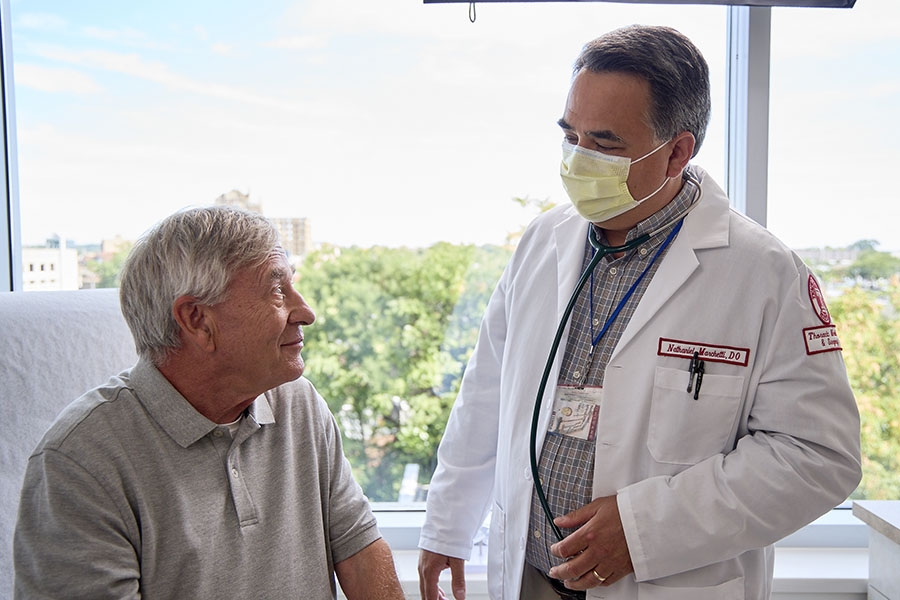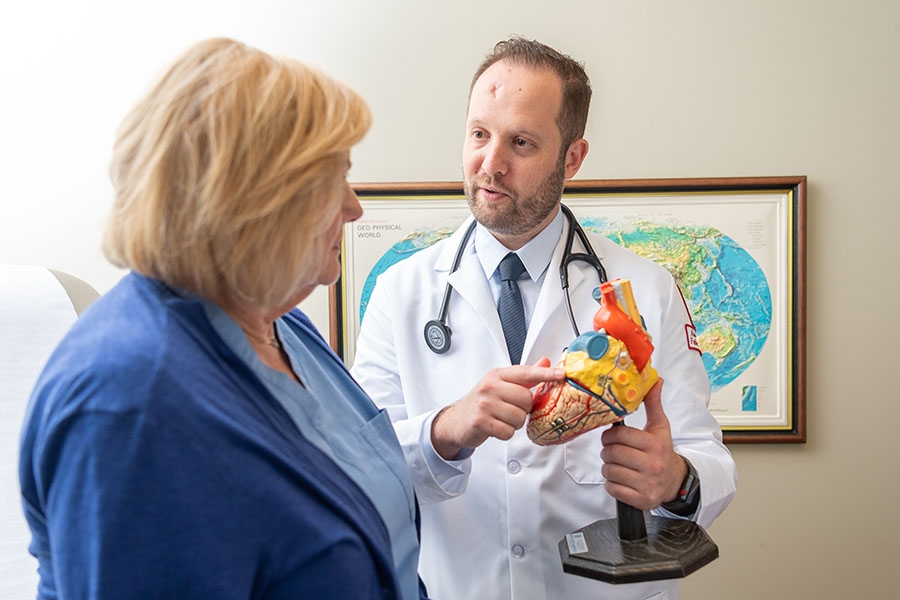Following your heart transplant, you’ll be on medications to help prevent organ rejection. The Temple transplant team will monitor your medications closely by drawing labs, evaluate your new heart through regular biopsies and periodic tests, and watch for symptoms of heart transplant rejection.
Rejection is part of your immune system’s normal defense process. The medications you take should help prevent your immune system from reacting to your new healthy heart. But sometimes, despite all preventive measures, heart transplant rejection does occur. It can sound scary, but most episodes of rejection can be reversed if detected early.
Types of Heart Transplant Rejection
There are different types of heart transplant rejection, depending on which part of your body your immune system is attacking. These include:
Acute cellular rejection
The most common type of heart transplant rejection is acute cellular rejection. This type of rejection occurs when your immune system’s T cells target your new heart — usually within the first 6 months of the surgery. However, it can happen after that as well.
Humoral rejection
Less common is humoral rejection (also called acute antibody rejection). This is when antibodies damage blood vessels including the arteries of the heart. It can happen within the first month after surgery, or even months or years later.
Preventing Heart Transplant Rejection
Temple’s transplant team has years of experience in working with patients who need a heart transplant. It’s through this extensive experience that we’re able to develop a customized plan for each of our patients to help them avoid heart transplant rejection.
A transplant coordinator will work closely with you to:
- Provide clear instructions about your heart transplant, both before and after your procedure
- Ensure you understand your medications and the purpose of the post-surgery follow-up process
- Teach you how to watch for symptoms of rejection and what to do in the event of rejection
You play a key role in your recovery, too. It’s important to keep all your post-surgery appointments and stay in close contact with your transplant coordinator. Take your medications exactly as instructed to assure good levels of immunosuppressive medicine.
What Causes Rejection?
Your immune system is not the only factor that can trigger heart transplant rejection. Several other factors may come into play and increase the risk of developing rejection, including:
- Failure to take immunosuppressive drugs as instructed by the Transplant team
- Not keeping appointments with care coordinators or not having lab work done on time
- Smoking
- Drinking excessive amounts of alcohol
- Lack of exercise and poor diet
- History of high cholesterol or insulin resistance
- History of coronary heart disease in the donor
- Being a young recipient
Symptoms of Organ Rejection
Heart transplant rejection may be reversed if detected early enough. Let your transplant team know if you experience any of the following symptoms:
- Feeling tired or weak
- Shortness of breath
- Fast or irregular heartbeat
- Drop in blood pressure
- Swelling of feet, hands or ankles
- Sudden weight gain
- Flu-like aches and pains
- Reduced amounts of urine
- Dizziness or fainting
- Nausea or loss of appetite
Detecting Organ Rejection
Your transplant coordinator will schedule regular follow-up appointments after your heart transplant procedure. These visits give you the opportunity to talk with the transplant team about any issues you may be having.
You will also be monitored for organ rejection with tests and procedures. This includes:
Cardiac biopsy
A tube with a small cutting tool is inserted into a chamber of your new heart to remove a tiny piece of muscle for examination and testing. In adults, cardiac biopsies generally are performed every week for the first 4 to 6 weeks after surgery and less often afterward up to 6 months.
After 6 months, most patients have a biopsy every month and every 3 months after the first year. Biopsies are usually performed annually, year 2 to 5 post-transplant. Screening biopsies can continue indefinitely as needed based on clinical evaluations.
Electrocardiogram and echocardiogram
An electrocardiogram and echocardiogram are tests that measure heart rhythm and function.
Genetic test
A sophisticated blood test called gene expression profiling detects genes linked to heart transplant rejection in blood cells.
Other tests
Tests such as coronary angiography, intravascular ultrasound and cardiac stress testing can determine the condition of blood vessels, another factor in organ rejection.
Treating Heart Transplant Rejection
To prevent the immune system’s natural response against the donor heart, you will take anti-rejection, or immunosuppression, medications. As the risk of rejection decreases, you may take fewer medications, although some medicines will be taken for the rest of your life.
Temple transplant coordinators will help you stay on track with your medications, which will also include antibacterial, antiviral and antifungal drugs to help fight infections.
Categories of anti-rejection drugs
Anti-rejection drugs fall into these 3 categories:
- Induction: Given in large doses immediately after transplantation to prevent rejection just after your transplant. May be continued after discharge for up to 30 days.
- Maintenance: All medications given before, during and after transplant.
- Anti-rejection: Given during a rejection episode.
Common immunosuppressive and anti-rejection drugs
Some of the most commonly prescribed immunosuppressive and anti-rejection drugs are:
Immunosuppressive drugs
- Cyclosporine
- Prednisone
- Tacrolimus
- Mycophenolate Mofetil
- Methylprednisolone
- Azathioprine
Anti-rejection drugs
- Atgam
- Basiliximab
- Daclizumab
Grading Rejection
When you have a cardiac biopsy, the tissue is evaluated by a doctor called a pathologist.
With acute cellular rejection, the pathologist looks for signs of rejection within the tissue, and gives it a rating based on a scale created by the International Society for Heart & Lung Transplantation:

